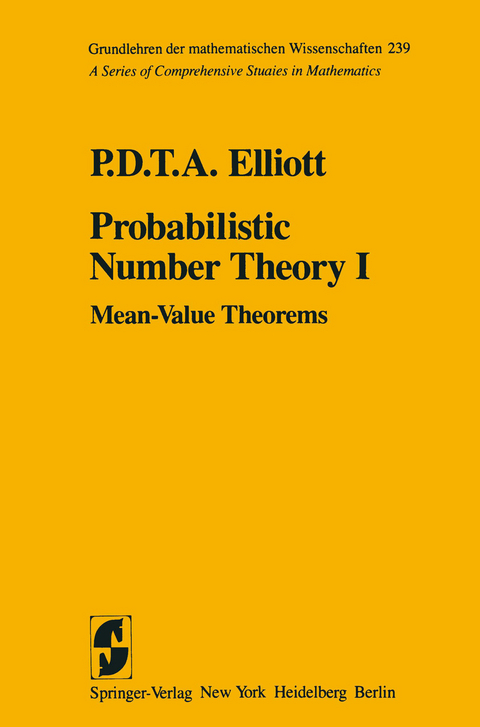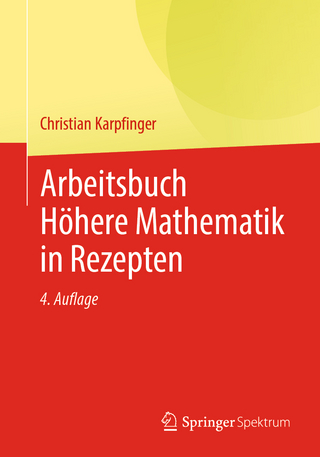
Probabilistic Number Theory I
Springer-Verlag New York Inc.
978-1-4612-9991-2 (ISBN)
Volume I.- About This Book.- 1. Necessary Results from Measure Theory.- Steinhaus’ Lemma.- Cauchy’s Functional Equation.- Slowly Oscillating Functions.- Halasz’ Lemma.- Fourier Analysis on the Line: Plancherel’s Theory.- The Theory of Probability.- Weak Convergence.- Lévy’s Metric.- Characteristic Functions.- Random Variables.- Concentration Functions.- Infinite Convolutions.- Kolmogorov’s Inequality.- Lévy’s Continuity Criterion.- Purity of Type.- Wiener’s Continuity Criterion.- Infinitely Divisible Laws.- Convergence of Infinitely Divisible Laws.- Limit Theorems for Sums of Independent Infinitesimal Random Variables.- Analytic Characteristic Functions.- The Method of Moments.- Mellin — Stieltjes Transforms.- Distribution Functions (mod 1).- Quantitative Fourier Inversion.- Berry-Esseen Theorem.- Concluding Remarks.- 2. Arithmetical Results, Dirichlet Series.- Selberg’s Sieve Method; a Fundamental Lemma.- Upper Bound.- Lower Bound.- Distribution of Prime Numbers.- Dirichlet Series.- Euler Products.- Riemann Zeta Function.- Wiener—Ikehara Tauberian Theorem.- Hardy—Littlewood Tauberian Theorem.- Quadratic Class Number, Dirichlet’s Identity.- Concluding Remarks.- 3. Finite Probability Spaces.- The Model of Kubilius.- Large Deviation Inequality.- A General Model.- Multiplicative Functions.- Concluding Remarks.- 4. The Turán-Kubilius Inequality and Its Dual.- A Principle of Duality.- The Least Pair of Quadratic Non-Residues (mod p).- Further Inequalities.- More on the Duality Principle.- The Large Sieve.- An Application of the Large Sieve.- Concluding Remarks.- 5. The Erdös—Wintner Theorem.- The Erdös—Wintner Theorem.- Examples ?(n),?(n).- Limiting Distributions with Finite Mean and Variance.- The Function ?(n).- Modulus of Continuity, an Example of an Erdös Proof.- Commentary on Erdös’ Proof.- Concluding Remarks.- Alternative Proof of the Continuity of the Limit Law.- 6. Theorems of Delange, Wirsing, and Halász.- Statement of the Main Theorems.- Application of Parseval’s Formula.- Montgomery’s Lemma.- Product Representation of Dirichlet Series (Lemma 6.6).- Quantitative form of Halász’ Theorem for Mean-Value Zero.- Concluding Remarks.- 7. Translates of Additive and Multiplicative Functions.- Translates of Additive Functions.- Finitely Distributed Additive Functions.- The Surrealistic Continuity Theorem (Theorem 7.3).- Additive Functions with Finite First and Second Means.- Distribution of Multiplicative Functions.- Criterion for Essential Vanishing.- Modified-weak Convergence.- Main Theorems for Multiplicative Functions.- Examples.- Concluding Remarks.- 8. Distribution of Additive Functions (mod 1).- Existence of Limiting Distributions.- Erdös’ Conjecture.- The Nature of the Limit Law.- The Application of Schnirelmann Density.- Falsity of Erdös’ Conjecture.- Translation of Additive Functions (mod 1), Existence of Limiting Distribution.- Concluding Remarks.- 9. Mean Values of Multiplicative Functions, Halász’ Method.- Halász’ Main Theorem (Theorem (9.1)).- Halász’ Lemma (Lemma (9.4)).- Connections with the Large Sieve.- Halász’s Second Lemma (Lemma (9.5)).- Quantitative Form of Perron’s Theorem (Lemma (9.6)).- Proof of Theorem (9.1).- Remarks.- 10. Multiplicative Functions with First and Second Means.- Statement of the Main Result (Theorem 10.1).- Outline of the Argument.- Application of the Dual of the Turán—Kubilius Inequality.- Study of Dirichlet Series.- Removal of the Condition p > p0.- Application of a Method of Halász.- Application of the Hardy—Little wood Tauberian Theorem.- Application of a Theorem of Halász.- Conclusion of Proof.- Concluding Remarks.- References (Roman).- References (Cyrillic).- Author Index xxm.
| Reihe/Serie | Grundlehren der mathematischen Wissenschaften ; 239 |
|---|---|
| Zusatzinfo | 393 p. |
| Verlagsort | New York, NY |
| Sprache | englisch |
| Maße | 155 x 235 mm |
| Themenwelt | Mathematik / Informatik ► Mathematik ► Algebra |
| Mathematik / Informatik ► Mathematik ► Arithmetik / Zahlentheorie | |
| Schlagworte | Algebra • Wahrscheinlichkeitstheoretische Zahlentheorie |
| ISBN-10 | 1-4612-9991-8 / 1461299918 |
| ISBN-13 | 978-1-4612-9991-2 / 9781461299912 |
| Zustand | Neuware |
| Haben Sie eine Frage zum Produkt? |
aus dem Bereich


